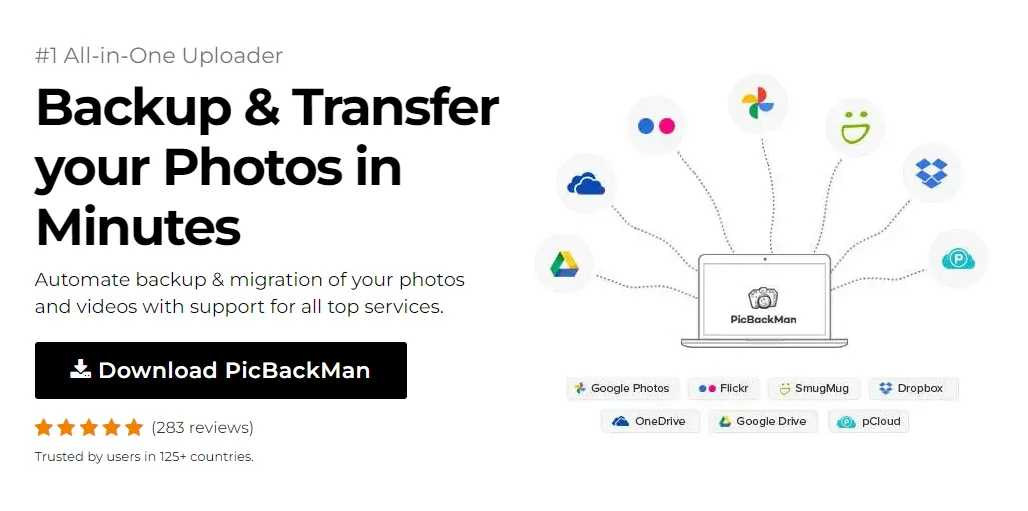Why is it the #1 bulk uploader?
- Insanely fast!
- Maintains folder structure.
- 100% automated upload.
- Supports RAW files.
- Privacy default.
How can you get started?
Download PicBackMan and start free, then upgrade to annual or lifetime plan as per your needs. Join 100,000+ users who trust PicBackMan for keeping their precious memories safe in multiple online accounts.
“Your pictures are scattered. PicBackMan helps you bring order to your digital memories.”
How to give people view-only access to your Dropbox files on Android phone?

Sharing files from your Android phone is something we all need to do at some point. Whether you're sending work documents, family photos, or project files, Dropbox makes this process simple. But what if you want people to see your files without being able to edit them? That's where view-only access comes in handy. In this guide, I'll walk you through the exact steps to give people view-only access to your Dropbox files using your Android device.
What is View-Only Access in Dropbox?
View-only access is exactly what it sounds like - it lets others see your files without giving them permission to edit, delete, or change them. This is perfect when you want to share information but need to keep the original file intact.
With view-only sharing, recipients can:
- Open and view the file
- Download the file (unless you disable this option)
- See file updates if you make changes
They cannot:
- Edit the file
- Delete the file
- Move the file to another folder
- Change sharing permissions
Step-by-Step Guide to Setting Up View-Only Access
1. Install and Set Up the Dropbox App
Before you can share files, you need to have Dropbox properly installed on your Android phone:
- Go to the Google Play Store on your Android device
- Search for "Dropbox"
- Tap "Install" to download and install the app
- Open the app and sign in to your Dropbox account
- If you don't have an account, follow the prompts to create one
2. Navigate to the File You Want to Share
Once you're logged in to Dropbox:
- Browse through your folders to find the file you want to share
- You can use the search function at the top of the screen if you have many files
- Make sure the file has finished uploading and syncing before attempting to share it
3. Share the File with View-Only Access
- Locate the file you want to share in your Dropbox app
- Tap the three dots (⋮) next to the file name to open the options menu
- Select "Share" from the menu that appears
- In the sharing screen, you'll see options for how to share the file
- Tap "Create a link" to generate a shareable link
- After creating the link, tap "Link settings"
- Under "Who can access," select "Anyone with the link"
- Under "What they can do," select "Can view"
- Toggle off "Allow downloads" if you want to prevent recipients from downloading the file
- Tap "Save" or "Apply" to confirm these settings
4. Share the Link with Recipients
Now that you've created a view-only link, it's time to share it:
- After saving your link settings, you'll return to the share screen
- Tap "Copy link" to copy the link to your clipboard
- Choose how you want to share the link:
- Paste it into a messaging app like WhatsApp or Messenger
- Send it via email
- Share directly to another app from the Dropbox sharing menu
- Add a message explaining what you're sharing if needed
- Send the link to your recipients
5. Sharing with Specific People
If you want more control over who can access your file, you can share directly with specific email addresses:
- Instead of creating a link, enter the email addresses of your recipients in the "Invite people" field
- Set permission to "Can view" for view-only access
- Add a message if needed
- Tap "Share" or "Send"
- Recipients will receive an email with a link to access the file
Sharing Entire Folders with View-Only Access
Need to share multiple files at once? Sharing a folder works similarly to sharing a single file:
- Navigate to the folder you want to share
- Tap the three dots (⋮) next to the folder name
- Select "Share"
- Choose between creating a link or inviting specific people
- Set permissions to "Can view"
- Share the link or send invitations
Managing Access to Shared Files and Folders
Checking Who Has Access
Want to see who can access your shared files? Here's how:
- Open the Dropbox app on your Android phone
- Navigate to the shared file or folder
- Tap the three dots (⋮) next to it
- Select "Share"
- You'll see a list of people who have access and their permission levels
Changing Access Permissions
Need to update someone's access level? Follow these steps:
- Open the sharing menu for the file or folder as described above
- Find the person whose access you want to change
- Tap on their current permission level
- Select "Can view" for view-only access or another option as needed
- The changes will be applied immediately
Revoking Access
If you need to remove someone's access completely:
- Open the sharing menu for the file or folder
- Find the person whose access you want to revoke
- Tap the three dots next to their name
- Select "Remove" or "Remove access"
- Confirm your choice when prompted
For shared links:
- Open the sharing menu
- Tap "Links"
- Select the link you want to revoke
- Tap "Remove link" or "Delete link"
- Confirm your choice
Advanced Sharing Options
Setting Link Expiration Dates
Want your shared link to stop working after a certain time? Here's how to set an expiration date:
- When creating or editing a shared link, tap "Link settings"
- Look for "Link expiration" or "Set expiration"
- Select a date when the link will expire
- Save your settings
- After the expiration date, the link will no longer grant access to your file
Setting Passwords for Shared Links
For extra security, you can password-protect your shared links:
- When creating or editing a shared link, tap "Link settings"
- Look for "Password protection" or "Add password"
- Toggle this option on
- Create a password
- Save your settings
- Share both the link and password with your recipients (preferably through different communication channels for security)
Disabling Downloads
If you want people to view your files but not download them:
- When setting up sharing, tap "Link settings"
- Look for "Allow downloads" option
- Toggle this option off
- Save your settings
- Recipients will be able to view the file in their browser but won't have the option to download it
Troubleshooting Common Issues
Recipients Can't Access the File
If people tell you they can't access your shared file, try these solutions:
- Check if you've set the correct permissions (make sure it's set to "Can view")
- Verify that you've shared with the correct email address
- Ensure the file hasn't been moved or deleted from your Dropbox
- Check if the link has expired (if you set an expiration date)
- Make sure recipients are using the correct password (if you set one)
- Try generating a new sharing link and sending it again
File Changes Not Appearing for Recipients
If you update a shared file but recipients still see the old version:
- Make sure the file has fully synced to Dropbox (check for the green checkmark)
- Ask recipients to refresh their browser or Dropbox app
- Check if you've shared the correct file (not an older version)
- In some cases, it may take a few minutes for changes to propagate to all users
Unable to Change Permissions
If you can't modify sharing permissions:
- Make sure you're the owner of the file (not someone who received it from another person)
- Check your internet connection
- Try closing and reopening the Dropbox app
- Update your Dropbox app if you're running an older version
- As a last resort, try accessing Dropbox through a web browser to change permissions
Best Practices for Sharing Files with View-Only Access
Organizing Files Before Sharing
To make file sharing more effective:
- Use clear, descriptive file names that indicate content and version
- Organize files into logical folders before sharing
- Remove any unnecessary or sensitive files from folders before sharing the entire folder
- Consider creating dedicated sharing folders to keep your personal and shared files separate
Security Considerations
To keep your files secure while sharing:
- Regularly review who has access to your files and revoke unnecessary access
- Use passwords for sensitive files
- Set expiration dates for temporary sharing needs
- Disable downloads for sensitive information
- Share with specific people rather than using open links when possible
- Be careful not to share folders that contain private information
Communication with Recipients
Clear communication helps prevent sharing problems:
- Let recipients know what you're sharing and why
- Explain that they have view-only access
- If you've set a password or expiration date, make that clear
- Provide instructions for accessing the file if recipients aren't familiar with Dropbox
- Ask recipients to confirm they can access the file
Quick Tip to ensure your videos never go missing
Videos are precious memories and all of us never want to lose them to hard disk crashes or missing drives. PicBackMan is the easiest and simplest way to keep your videos safely backed up in one or more online accounts.
Simply download PicBackMan (it's free!), register your account, connect to your online store and tell PicBackMan where your videos are - PicBackMan does the rest, automatically. It bulk uploads all videos and keeps looking for new ones and uploads those too. You don't have to ever touch it.
Comparison: View-Only vs. Other Sharing Options
| Feature | View-Only Access | Edit Access | Comment-Only Access |
|---|---|---|---|
| Can see the file | Yes | Yes | Yes |
| Can edit the file | No | Yes | No |
| Can comment on the file | No | Yes | Yes |
| Can download the file | Yes (unless disabled) | Yes | Yes (unless disabled) |
| Can share with others | No | Yes (if allowed) | No |
| Best for | Sharing final documents, reference materials | Collaboration, group projects | Feedback, reviews |
Alternative Methods for Sharing Files from Android
Using the Dropbox Website
If the app is giving you trouble, try the web version:
- Open a web browser on your Android phone
- Go to dropbox.com and sign in
- Navigate to the file you want to share
- Tap the share icon or three dots next to the file
- Follow similar steps as in the app to set view-only permissions
Using Other Cloud Storage Apps
If Dropbox isn't meeting your needs, consider these alternatives:
- Google Drive: Offers similar sharing options with view-only capabilities
- OneDrive: Microsoft's cloud solution with comprehensive sharing controls
- Box: Business-focused storage with strong permission settings
Direct File Sharing Methods
For quick, temporary sharing without Dropbox:
- Email attachments: Good for small files
- Messaging apps: Convenient but may compress files
- Bluetooth: Works without internet but requires proximity
- NFC sharing: Fast for compatible devices in close range
Frequently Asked Questions
1. Can I change a file from edit access to view-only after I've already shared it?
Yes, you can change access permissions at any time. Open the Dropbox app, go to the shared file, tap the three dots, select "Share," find the person whose access you want to change, and update their permission level from "Can edit" to "Can view."
2. If I share a folder with view-only access, what happens when I add new files to it?
When you add new files to a shared folder, those files will automatically be accessible to anyone with access to the folder. They'll maintain the same permission level (view-only) that you set for the folder.
3. Can people with view-only access still make a copy of my files?
Yes, unless you disable downloads, people with view-only access can still download or screenshot your files. They can then make their own copy to edit. The original file in your Dropbox remains unchanged, but be aware that the content itself can be copied.
4. Will I be notified when someone views my shared file?
Basic Dropbox accounts don't provide notifications when someone views your shared file. However, Dropbox Business and Professional accounts offer file activity tracking that shows when someone has accessed your shared files.
5. Can I share files with someone who doesn't have a Dropbox account?
Yes! When you create a shareable link, anyone with that link can access the file, even if they don't have a Dropbox account. They'll be able to view the file in their web browser. If you share directly with an email address, they'll receive an invitation to view the file, which they can access by creating a free Dropbox account or sometimes directly through their browser.
Conclusion
Giving people view-only access to your Dropbox files from your Android phone is a straightforward process that gives you control over your shared content. By following the steps outlined in this guide, you can easily share files while maintaining their integrity and controlling who can make changes.
Remember to regularly review your shared files and folders to ensure only the right people have access. Take advantage of features like password protection and expiration dates for sensitive information. With these tools at your disposal, you can confidently share files from your Android device without worrying about unwanted changes or unauthorized access.
Whether you're sharing work documents, family photos, or project files, Dropbox's view-only sharing option provides the perfect balance between accessibility and control. Now you can share with confidence right from your Android phone!






